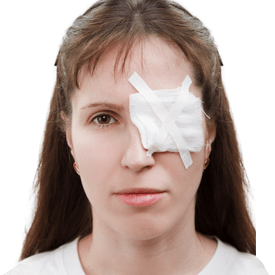

ABOUT RETINAL DETACHMENT
A retinal detachment is considered a serious eye condition that occurs when the retina separates and detaches from the surrounding tissue at the back of the eye. It usually requires immediate medical attention and in many cases, surgery. Dr. Shalesh Kaushal is a leading retina surgeon whose primary focus is the overall health of the retina. He offers a number of advanced treatments to correct and repair a retinal detachment. When a patient visits our Ocala, FL retina practice with a retinal detachment, they typically are suffering from a severe loss of vision, blurry vision, floaters, and unexplained flashes of light. While this can be unsettling, Dr. Kaushal works with each patient to effectively offer a proper diagnosis and a course of treatment for the best possible outcome. Many patients experience a retinal tear prior to a detachment. Routine eye exams are important if you have experienced a tear to ensure the retina is attached and healthy.
RETINAL DETACHMENT CAUSES AND SYMPTOMS
Diseases and conditions associated with the retina often afflict the elderly and are more prominent in this age group. Aging can weaken the retina and cause various problems including a detachment. In most cases, a retinal attachment is caused by the vitreous gel losing its shape. When this occurs, the gel can pass through a retinal tear or hole, which can damage nearby blood vessels, tissue, and intricate structures inside the retina. In addition to age, the retina can become weakened due to certain preexisting conditions such as diabetes. Those who have experienced a previous eye injury or trauma, have had cataracts or cataract surgery, are severely nearsighted, or have a family history of retinal disease have a higher chance of experiencing a retinal detachment. While a retinal detachment is not necessarily painful, the symptoms can be worrisome. Reduced peripheral vision, floaters, flashes of light, blurred vision, a sudden decrease in visual acuity, and a loss of eyesight are the most common symptoms associated with a retinal detachment.
RETINAL DETACHMENT DIAGNOSIS
Dr. Kaushal will provide a thorough eye examination and look at the retina using an ophthalmoscope, a specialized instrument with a unique lens and bright light. This is used to examine the back of the eye so Dr. Kaushal can assess if a hole, tear, or detachment exists within the retina. In some cases, an ultrasound may be used so that digital, detailed images can be shown of the back of the eye. Symptoms associated with a retinal detachment may only affect one eye; however, during this examination, both eyes will be evaluated.
RETINAL DETACHMENT TREATMENT AND PROGNOSIS
Treatment for a retinal detachment will depend on the severity of the condition, as well as the progression of any preexisting underlying conditions. Typically, surgery is the most effective way to treat a retinal detachment. Dr. Kaushal may choose one of numerous procedures to treat the condition. One of the most common approaches is through a vitrectomy, which involves draining the vitreous fluid and correcting any tissue that is pulling away from the retina. Pneumatic retinopexy is generally used along with a vitrectomy or it can be used alone. It involves injecting a gas or air bubble into the central part of the eye. This way, the bubble can slowly push against the retina to block or contain the hole(s) against the eye wall, which prevents the fluid from flowing behind the retina. Cryopexy (freezing therapy) is also another common treatment where a frozen probe is applied to the eye’s surface over the tear, causing a scar to secure the retina back into place. Cryopexy can be combined with both a vitrectomy or pneumatic retinopexy.
After a surgical procedure to correct a retinal detachment, most patients can expect vision recovery within a few weeks. It could take several months before vision is restored. Some patients may require an additional treatment to help restore additional vision. Most patients can expect vision recovery after a procedure. It’s important to note that some patients never regain all of their lost vision.
TREAT RETINAL DETACHMENT
While a retinal detachment isn’t painful, it can cause serious problems such as a loss in vision. The sooner that a retinal detachment is diagnosed and treated, the better the prognosis. Ocala, FL board-certified retina surgeon, Dr. Shalesh Kaushal, offers thorough eye examinations for patients who experience symptoms associated with this condition. If you are experiencing any symptoms, contact Comprehensive Retina Consultants today for your thorough evaluation.


